
Are You Wired for Success or Failure?

THE SECRET BEHIND WHY SOME PEOPLE ACHIEVE THEIR DREAMS AND OTHERS DON’T
At the Amen Clinics we have been balancing troubled brains for more than twenty years. We see small children and the elderly and everyone in between. People come to see us because we use sophisticated brain imaging technology to help us understand and treat our patients, plus we use natural treatments whenever possible. It is through the lens of our imaging work that I discovered that when I improve how your brain functions, not only do I help you overcome problems such as attention deficit disorder (ADD), anxiety, depression, addictions, and anger, I also help you be more thoughtful, creative, energetic, focused, and effective.
After looking at nearly fifty thousand scans, it is clear to me that a balanced brain is the foundation for a life that is happier, healthier, wealthier, and wiser. That is the promise of this book: if you really understand how to develop and take care of your brain, your life will be better no matter what your age.
One question people often ask me is whether the mind is separate from the brain. The answer is clearly no. The mind and the brain are completely dependent on each other. Just think with me about Alzheimer’s disease, which is clearly a brain illness. Images 1.1 and 1.2 depict two brain single photon emission computed tomography (SPECT) scans. These are the scans we do in our clinics. SPECT is called a functional scan, because it shows how the brain works; it measures blood flow and activity patterns. Image 1.1 is of a healthy person. It shows full, even, symmetrical activity. Image 1.2 shows a woman who has Alzheimer’s disease. The holes indicate very low activity in several important areas of her brain.
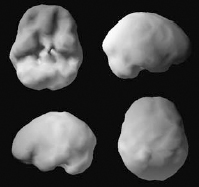
Image 1.1: Healthy Brain
Full, even, symmetrical activity
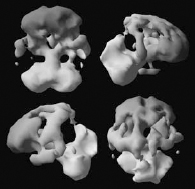
Image 1.2: Alzheimer’s Disease
Deterioration back half of brain
Do people with Alzheimer’s disease lose their minds? Yes, they do as the disease progresses. When you lose brain tissue you lose your memory and your ability to think clearly.
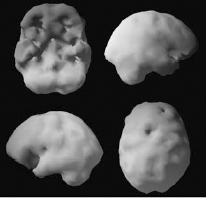
Image 1.3: Soldier’s Brain Damage
Notice damage in the front of the brain.
Now let’s consider brain trauma. Image 1.3 depicts a soldier’s brain that was damaged in an explosion in Iraq. He was discharged from the army within a year of the accident because he kept getting into fights with other soldiers, something that did not happen before the injury. Does brain damage affect a person’s ability to get along with others? Of course it does! Damage the brain and you damage the mind and most everything else in your life.
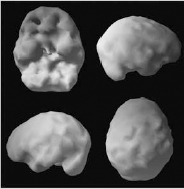
Image 1.4: ADD Before Treatment
Decreased frontal lobe activity
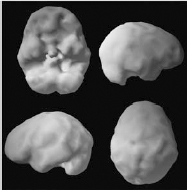
Image 1.5: ADD After Treatment
Improved frontal lobe activity
But what if we improve the brain? Does that improve the mind? Here’s an example. Jenny, age sixty-two, came to see us for dyslexia and ADD. She had suffered her whole life, underachieved at school and at work, and felt defective and stupid. She had been divorced twice and was estranged from her children. I had treated her son for ADD, and he subsequently reached out to her. With the proper diagnosis and treatment she was able to feel much better and was able to make peace with her children. (See Images 1.4 and 1.5.)
A balanced brain is the foundation for a magnificent mind. Here is a recent letter I received from the mother of one of my patients.
(with permission)
Dear Dr. Amen,
I am the mother of Dale B. who was treated at the Amen Clinic approximately 8 years ago. Dale was 17 and in trouble with the law. He was brought to the clinic in shackles. After evaluation and treatment, Dale was able to be gainfully employed for 1 year in retail sales. He then joined the Army where he excelled. Dale immediately became an Army Ranger. Dale was able to make a success of his life because of the treatment he received at the Amen Clinics. Dale was killed in action in Iraq on 3/18/06 just 3 days before his 24th birthday. We take great comfort in knowing Dale died a Hero. I thought you might be interested in the part you played in this Hero’s life. Dale was buried at Arlington Cemetery with great honor.
Thank you,
Laura B.
Proud Mother of Sgt. Dale B.
Helping to unchain a young man from the shackles of failure to become a decorated war hero is a humbling experience. Even though Dale’s death was very sad, he died on his own terms, doing something he loved. The details of Dale’s story are unique, but the essence is not. I have received many, many letters thanking me for changing someone’s brain and changing his or her life.
Most people have the completely wrong idea about accomplishment and about what holds people back from realizing their dreams. The majority of people, like me before I began this work, take a commonsense approach. This is the same approach espoused by most self-help gurus, business executives, and head coaches who write “how I won the championship” books. Try harder, they say, be your own person, visualize your success, work longer, take responsibility, stop complaining, change your attitude, and do not let anyone get in your way. With diligent devotion, you can be anything you want in life. If you are not successful, then you are lazy, willful, or need an attitude adjustment. Look at me. If I can do it, you can too.
The problem with this approach is that it simply doesn’t work for many people who sincerely try to incorporate it into their lives. It often backfires. The harder many people try, the worse their brains, abilities, and behaviors get. No doubt the tough love, kick-in-the-butt approach works for some, but it leaves countless others feeling demoralized, disconnected, hopeless, and unworthy.
How effective do you think I would have been with seventeen-year-old Dale B. when he came to our clinic in shackles if I chewed him out and told him to try harder, just like all the other adults in his life had already done? Not very effective. What we did was completely different.
A magnificent mind starts with a healthy brain. For you to realize your dreams in any area of your life, requires your brain must work right. Your brain controls everything you do: how you think, how you feel, how you act, and how well you get along with other people. When the brain works right, you work right. When your brain is troubled, you have trouble in your life.
Before we did anything with Dale we understood the context of his life, listened to how he thought and took sophisticated images of how his brain worked. It was clear from the scans and his behavior that Dale suffered from a brain that was out of balance. As we optimized the three-pound supercomputer between his ears he was able to mature, gain self-control, and claim a more effective life. With understanding and a balanced brain, he was able to develop the abilities to live a hero’s life, serving his country and making his parents proud beyond words. With an unbalanced brain, he likely would have remained ashamed of himself, a disappointment to his family and a drain on society.
The first key to a magnificent mind is a balanced brain. With a balanced brain we are able to learn from our own experiences and from other people to make our own lives the best they can be. The first step in investigating failure is to understand the brain. An unbalanced brain causes its owner immeasurable trouble, including difficulties learning, being distracted and impulsive, and making the same mistakes again and again.
The Secret Behind Why Some Achieve Their Dreams and Others Don’t
With an unbalanced brain most self-help or societal strategies to improve behavior do not work. Consider prison. Clearly, it is an extreme and costly attempt to modify behavior. Yet the recidivism rate is 60–70 percent within five years. Few people ever consider looking at the brain in helping people whose behavior is so bad they end up in jail. In a 2007 study that my colleagues and I published in the Journal of Neuropsychiatry, we found that murderers had significantly lower overall activity in their brains compared with a healthy group, especially when they performed a concentration task. These findings were especially prominent in the prefrontal cortex, the area of the brain that acts as the supervisor, inhibiting impulses and difficult behavior. We will never improve bad behavior until we balance the underlying organ that drives it.
Or consider marital therapy. According to a 2005 New York Times article, two years after ending counseling, 25 percent of couples were worse off than when they started, and after four years up to 38 percent were divorced. Very few marital therapists ever consider looking at the brain in trying to help failing relationships, and that is a mistake. Consider the following example.
In 2006 I gave a lecture to one thousand people at Skyline Church in San Diego. The next year I was invited back. As often happens when I speak at a place for the second time, a number of people approach me as I walk into the lecture hall or sanctuary with their SPECT scans. My lecture motivated them to come to one of our clinics to have their own brain evaluated. On this occasion, a thirty-five-year-old man, Todd, came up to me to show me his scan (see Image 1.6). The scan shows a swiss cheese appearance, indicating seriously low overall activity, the same pattern we often see in our drug or alcohol abusers. As I looked at the scan, Todd said, “You think I am a drug addict, don’t you?”
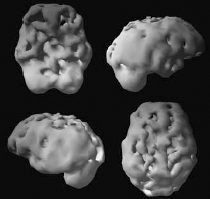
Image 1.6: Todd’s Brain
Swiss cheese or toxic appearance
“The thought had crossed my mind,” I replied.
“I have never used drugs,” Todd said. “And I don’t drink. Before I came to your clinic I used to paint cars in my garage, without much ventilation. I don’t do that anymore.”
“That is the sign of intelligent life,” I replied. “New information causes you to change your behavior.”
He went on to tell me that he and his wife had been in marital therapy for several years without any benefit. After his visit to the clinic in Newport Beach he started to live a brain-healthy life. He began taking a multiple vitamin and fish oil and the other brain-healthy supplements we recommended, and he improved his eating and exercise habits. The difference, he said, had been life changing. After his brain was better, he was able to be a better husband. I wonder how many marriages are suffering because one partner has a brain problem that no one is aware of. How do you do marital therapy with this brain? It will never work, until you help heal the brain first.
In every walk of life a magnificent mind is tied to brain function, but because we never directly look at the brain and rarely think about its impact on our own lives, we often miss this most important puzzle piece in trying to realize our dreams.
The Ideas of Change
Over the past three decades my primary work has been as a psychiatrist and brain imaging specialist. I became a psychiatrist to study human behavior to learn how and why people develop magnificent minds. I started imaging the brain eighteen years ago because I realized after nine years of being a psychiatrist that I was missing important information to help my patients. To really help people change, I discovered that I must understand and optimize the organ of change, the brain, in individual patients.
Shortly after beginning my brain imaging work with people hospitalized for psychiatric problems, a series of ideas started to percolate in my own brain. Over the next few years, the ideas crystallized and have become part of almost everything I have done since.
A magnificent mind starts with a balanced brain.
Failure is often the result of a brain gone wrong.
Not everyone has the same brain function.
Optimize the brain and you dramatically increase a person’s abilities.
Use every option available to balance the brain, including natural supplements, diet, exercise, thinking strategies, and if needed, medication.
Teach people skills; do not just give them pills.
I ordered my first brain SPECT study on psychiatric patients in the spring of 1991. I was using the study to help understand the underlying brain problems of my patients to better target their treatment. At the time, I had a very busy psychiatric practice. I was treating people in my private clinic and those in the hospital where I was the director of the dual-diagnosis program for patients who had substance abuse and psychiatric problems. I was excited about SPECT because it helped me be a better doctor. It helped me be more effective in helping my patients. Even though SPECT scans are of tremendous value in understanding individual brains, you do not need a scan to benefit from this book. By studying tens of thousands of scans I have developed a checklist (see chapter 3) to help people predict what their scan might look like if they could get one. The checklist will help you understand your brain’s specific needs and guide you on ways to help it.
Magnificent Mind at Any Age is ultimately about understanding how the brain is involved in the day-to-day operations of your life no matter what your age and giving you specific strategies to optimize it naturally. The book will help you unlock your abilities in work, school, and relationships, and bring you closer to your own potential for accomplishment, connection, and happiness.